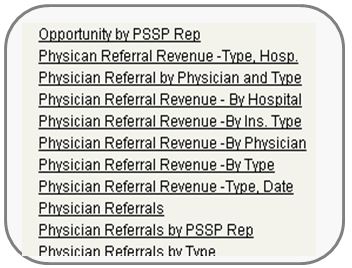Turn your salesforce into a BI solution
The key problem one of the Radiology – healthcare providers was facing was visibility to their referral information. They were using Net.Orange, and was proving to be quite expensive.
To run their day to day operations, they were using Amicas a leading EMR/Radiology Information System, which managed patient scheduling, physician information and all details other than the billing information, which was managed by another system. While it contained all key data from referral standpoint, they were unable to understand and related referral activities to that of physician liaison and outreach activities.
We used Healthcare CRM
Physician Relationship and Referral Management module built on force.com and we are able to quickly set up the sales and marketing end of it. Th e key still remained to extract information out of the EMR and scheduling system. We had a couple of options
e key still remained to extract information out of the EMR and scheduling system. We had a couple of options
- Leverage HL7 – HL7 is an event-driven protocol and two transactions namely ADT (Admit – discharge) and SIU (Scheduling) was relevant in this case. The issue was that not elements were passed through with the transaction – like complete referring physician information or diagnosis codes and we were not able to extract historical data as it was needed for forecasting future referral.
- Perform an export in flat-files and manually import it. While it sounded like was inexpensive way to do it, it was quite expensive in the long run. Also, we had seen a drop in usage as folks would forget to perform an import.
- Automate data extract and import of data using DBSync. We were able to tap into the SQL Server and construct views for each of the data sets required for our analysis. We then scheduled data extracts every 15 minutes with the built-in scheduler and push to force.com.
Analytics
While Force.com has built-in reports, dashboards, and workflows, it does lack some statistical calculations like variance and drop-offs. We added realtime calculations on a number of statistical calculations required for analysis using APEX – an on-demand programming language for force.com. These routines would run at either real-time to process referral statistics as it came through the integration or run every day at a scheduled interval.
The end result was an on-demand data warehousing and analytical tool to provide clear real-time reports and dashboards, along with workflows to automate notifications of referral drop offs by physicians or new physician referrals.
One comment
Leave a Reply
You must be logged in to post a comment.

thanks